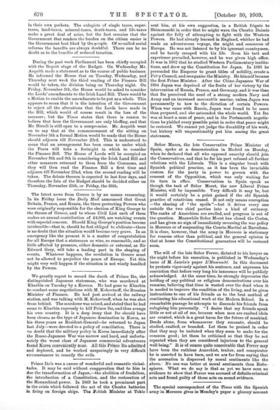The will of the late Senor Ferrer, dictated to his
lawyer on the night before his execution, is published in Wednesday's issue of M. Jaures's paper L'Humanite. In this document he protests vigorously against his sentence, and expresses his conviction that before very long his innocence will be publicly acknowledged. At the same time, he strongly deprecates the holding of any political or religious demonstrations over his remains, believing that time is wasted over the dead when it is needed to improve the condition of the living, and he gives instructions to one of his friends as to the best method of continuing his educational work at the Modern School. In a remarkable passage he attempts to dissuade his friends from eulogising him personally. "I desire that my friends speak little or not at all of me, because when men are exalted idols are created, which is a great harm for the future of mankind. Deeds alone, from whomsoever they emanate, should be studied, exalted, or branded. Let them be praised in order that they may be imitated when they seem to make for the common good ; let them be criticised so that they be not repeated when they are considered injurious to the general well-being." It is of course quite conceivable that Ferrer may have been the ruthless Anarchist, traitor, and conspirator he is asserted to have been, and we are far from saying that the accusation is disproved by moral sentiments like the above. No one was better at moral sentiments than Robe- spierre. "What we do say is that as yet we have seen no evidence to show that Ferrer was accused of definite criminal acts and found guilty of those acts on sound evidence.










































 Previous page
Previous page